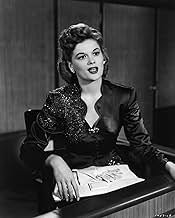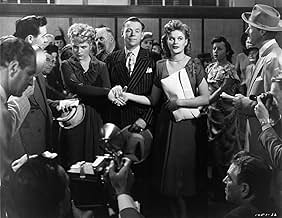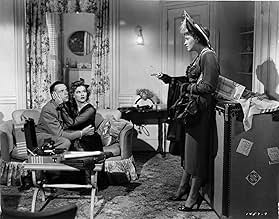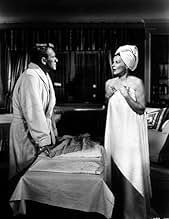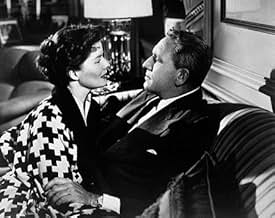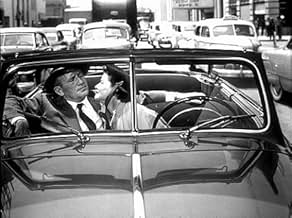AVALIAÇÃO DA IMDb
7,4/10
24 mil
SUA AVALIAÇÃO
O caso de uma esposa que atira no marido e na amante divide um casal de advogados, ele do lado da acusação, ela da defesa.O caso de uma esposa que atira no marido e na amante divide um casal de advogados, ele do lado da acusação, ela da defesa.O caso de uma esposa que atira no marido e na amante divide um casal de advogados, ele do lado da acusação, ela da defesa.
- Direção
- Roteiristas
- Artistas
- Indicado a 1 Oscar
- 3 vitórias e 5 indicações no total
Edward Andrews
- Kip's neighbor
- (não creditado)
Bonnie Bannon
- Woman in Courtroom
- (não creditado)
Charles Bastin
- Young District Attorney
- (não creditado)
Harry Baum
- Commuter
- (não creditado)
Joseph E. Bernard
- Mr. Bonner - Adam's Father
- (não creditado)
- Direção
- Roteiristas
- Elenco e equipe completos
- Produção, bilheteria e muito mais no IMDbPro
Avaliações em destaque
'Adam's Rib' is arguably the greatest Tracy-Hepburn film, and is certainly the most popular of their teamings. Brightly written (by the husband and wife team of Ruth Gordon and Garson Kanin), it takes the premise of a wife (the sparkling Judy Holliday, in her film debut) on trial for shooting her unfaithful husband (Tom Ewell, establishing himself in the kind of role he'd reprise in The Seven-Year Itch), and turns it into a forum of the sexual values and standards of the 1940s, and a showcase for the fabulous Tracy and Hepburn, who were were never better than as the battling D.A. and defense attorney. In the courtroom and out, the love they share, and tweaking of each other's egos is a sheer joy to watch. That the story is also a knowing commentary about women's inequality under the law makes the film even more topical today, and doesn't reduce the film's enjoyment value at all. It is a VERY funny film, and can be enjoyed at MANY levels!
In addition to Holliday and Ewell, the supporting cast includes the terrific David Wayne as a smarmy songwriter-neighbor who covets Hepburn, and 'writes' the ditty 'Goodbye, Amanda' for her (actually composed by Cole Porter, Hepburn's character's name in the film was changed to Amanda, to fit the song!)
Among the many wonderful scenes of the film are the 'home movie', which accurately reflected much of Tracy and Hepburn's own relationship; the infamous massage scene ("I know a slap...!"); the circus 'Strong Woman', demonstrating that women can be as physically powerful as men by lifting the panicking Tracy over her head easily (in the middle of the courtroom!); the infamous licorice-gun confrontation as Tracy confronts Hepburn with Wayne; and Tracy's crying-on-demand revelation.
'Adam's Rib' is a film which never seems to age, but just gets better and better!
In addition to Holliday and Ewell, the supporting cast includes the terrific David Wayne as a smarmy songwriter-neighbor who covets Hepburn, and 'writes' the ditty 'Goodbye, Amanda' for her (actually composed by Cole Porter, Hepburn's character's name in the film was changed to Amanda, to fit the song!)
Among the many wonderful scenes of the film are the 'home movie', which accurately reflected much of Tracy and Hepburn's own relationship; the infamous massage scene ("I know a slap...!"); the circus 'Strong Woman', demonstrating that women can be as physically powerful as men by lifting the panicking Tracy over her head easily (in the middle of the courtroom!); the infamous licorice-gun confrontation as Tracy confronts Hepburn with Wayne; and Tracy's crying-on-demand revelation.
'Adam's Rib' is a film which never seems to age, but just gets better and better!
Adam's Rib (George Cukor, 1949) is often hailed as the best "battle-of-the-sexes" comedy on celluloid, but it's beset with the same problems as the bulk of these Tracy-Hepburn vehicles: dated social observation that's tricky to navigate today, a lack of laughs and dramatic sequences that are just too heavy. The leads are a blissfully married couple who clash when they take opposing sides in a murder trial: assistant DA Spence leads the prosecution of wronged wife Judy Holliday (who is magnificent), while crusading feminist Kate leaps to her defence. Holliday plugged philandering husband Tom Ewell, you see, then fired wildly around the flinching floozy he was nuzzling up to, Jean Hagen.
The acting is absolutely stunning - universally superb - and there's smart use of newspaper inserts and a puppet show motif, but the material is spotty and chunky, with humour arriving in slabs rather than being weaved through the narrative. Kudos to former stage star David Wayne (he played Og in the smash Broadway version of Finian's Rainbow) for being so formidably irritating as Hepburn's extremely camp confidante and suitor. His reading of Cole Porter's specially adapted song Farewell, Amanda is a rare moment of respite in a teeming sea of annoyance. Hepburn asked her favourite director, Cukor, to favour Holliday in the filming of their scenes and leaked stories to the press about Judy's revelatory performance enraging both the leads. The ploy was designed to land her apprentice the lead in the screen adaptation of Born Yesterday, which she had initiated on stage. It worked - and she took home the Best Actress Oscar the following year.
As for Adam's Rib, it's impressive and memorable but, despite all that, resolutely not a classic.
The acting is absolutely stunning - universally superb - and there's smart use of newspaper inserts and a puppet show motif, but the material is spotty and chunky, with humour arriving in slabs rather than being weaved through the narrative. Kudos to former stage star David Wayne (he played Og in the smash Broadway version of Finian's Rainbow) for being so formidably irritating as Hepburn's extremely camp confidante and suitor. His reading of Cole Porter's specially adapted song Farewell, Amanda is a rare moment of respite in a teeming sea of annoyance. Hepburn asked her favourite director, Cukor, to favour Holliday in the filming of their scenes and leaked stories to the press about Judy's revelatory performance enraging both the leads. The ploy was designed to land her apprentice the lead in the screen adaptation of Born Yesterday, which she had initiated on stage. It worked - and she took home the Best Actress Oscar the following year.
As for Adam's Rib, it's impressive and memorable but, despite all that, resolutely not a classic.
Lawyers Spencer Tracy (Adam) and Katharine Hepburn (Amanda) spend the film on opposite sides during the trial of Judy Holliday (Mrs Attinger) who is up on a charge of attempted murder after she shoots her husband Tom Ewell (Mr Attinger). Given that the film is a comedy, it can only really end one way for Judy Holliday.
Tracy and Hepburn undoubtedly work well together but the film has occasions where these two characters talk across each other and it just seems too shouty. It may be realistic but it certainly is not entertaining. Hepburn tends to over-exaggerate and lay on the dramatics when she acts and Spencer Tracy is clearly the better actor of the two. Actually, the best character is that played by Tom Ewell. He steals the film in all his scenes because he is genuinely funny. Judy Holliday is good if you can get past her terrible voice but musician neighbour David Wayne (Kip) is awful – not in the fact that he is meant to be an annoying character, but in the fact that he doesn't know how to convincingly portray a realistic person. He plays it gay one minute, then straight another minute, he's rubbish at acting. Nothing about his character rings true.
At the heart of the film is Hepburn's ridiculous notion about women's lib and some sort of feminist ideals – you know, the sort of thing that makes women annoying. Face the facts Hepburn, Judy Holliday had just tried to kill someone for goodness sake – it's got nothing to do with gender!
It's certainly a watchable film with some amusing parts (mainly with Tom Ewell), and some annoying parts (Katharine Hepburn and every appearance of David Wayne), and overall, it's more annoying than funny. Certainly not a classic as people seem to believe because they are told that it is. Everyone has done better.
Tracy and Hepburn undoubtedly work well together but the film has occasions where these two characters talk across each other and it just seems too shouty. It may be realistic but it certainly is not entertaining. Hepburn tends to over-exaggerate and lay on the dramatics when she acts and Spencer Tracy is clearly the better actor of the two. Actually, the best character is that played by Tom Ewell. He steals the film in all his scenes because he is genuinely funny. Judy Holliday is good if you can get past her terrible voice but musician neighbour David Wayne (Kip) is awful – not in the fact that he is meant to be an annoying character, but in the fact that he doesn't know how to convincingly portray a realistic person. He plays it gay one minute, then straight another minute, he's rubbish at acting. Nothing about his character rings true.
At the heart of the film is Hepburn's ridiculous notion about women's lib and some sort of feminist ideals – you know, the sort of thing that makes women annoying. Face the facts Hepburn, Judy Holliday had just tried to kill someone for goodness sake – it's got nothing to do with gender!
It's certainly a watchable film with some amusing parts (mainly with Tom Ewell), and some annoying parts (Katharine Hepburn and every appearance of David Wayne), and overall, it's more annoying than funny. Certainly not a classic as people seem to believe because they are told that it is. Everyone has done better.
10Cinemayo
Spencer Tracy and Katharine Hepburn make fireworks in this cute film about a well-to-do married couple who both happen to be lawyers. Hepburn is a die-hard Woman's Rights supporter, so when a ditzy lady is charged with shooting her husband after catching him being unfaithful, Kate decides to take her case and defend her. The trouble is, old-fashioned husband Tracy is already penciled in as the prosecuting attorney. Let the Battle of the Sexes begin!
The script sets up a great opportunity to have Tracy and Hepburn sparring with one another during every phase of the trial, as well as at home every night after they've spent each day trying to outwit each other. As a comedy, there aren't any huge belly-laughs, but it's a charming enough little take on the differences between men and women which also manages to make the point that, in many ways, the sexes aren't really all that different when all is said and done.
**** out of ****
The script sets up a great opportunity to have Tracy and Hepburn sparring with one another during every phase of the trial, as well as at home every night after they've spent each day trying to outwit each other. As a comedy, there aren't any huge belly-laughs, but it's a charming enough little take on the differences between men and women which also manages to make the point that, in many ways, the sexes aren't really all that different when all is said and done.
**** out of ****
Adam's Rib turned out to be a delightfully cheeky romp with a kicker sense of humour, all acted out with ease by Spencer Tracy & Katherine Hepburn. I love how the film veers from the courtroom right into their marital home and becomes not just about a battle of wills, but a battle of the sexes as well, much fun watching this famous couple go at each other, both at work and at home. The film benefits greatly from the appearance of the lovely Judy Holliday in her breakthrough role, and it amused me greatly to see David Wayne playing a shifty character as I remember him fondly from the Twilight Zone episode Escape Clause in 1959. 8/10
Você sabia?
- CuriosidadesInspired by the real-life story of husband-and-wife lawyers William Dwight Whitney and Dorothy Whitney, who represented Raymond Massey and his ex-wife Adrianne Allen in their divorce. After the Massey divorce was over, the Whitneys divorced each other and married the respective Masseys.
- Erros de gravaçãoDuring the trial proceedings, a Black juror was in the first row, but the trial scene following the argument between Amanda and Adam where Adam walks out of the home, the jury makeup has now changed and the Black juror is not present. However the following day when court resumes for the jury verdict, the Black juror is back in the jury box.
- Cenas durante ou pós-créditosOpening credits are little curtains that go up and down, on a stage in a performance hall.
- Versões alternativasAlso available in a computer colorized version.
- ConexõesEdited into Hollywood: The Dream Factory (1972)
- Trilhas sonorasFarewell, Amanda
(1949)
Music and Lyrics by Cole Porter
Played during the opening credits and often in the score
Sung by David Wayne (uncredited), accompanying himself on the piano
Reprised by the voice of Frank Sinatra (uncredited) on the radio
Whistled by Katharine Hepburn (uncredited)
Sung a cappella by Spencer Tracy (uncredited)
Principais escolhas
Faça login para avaliar e ver a lista de recomendações personalizadas
Detalhes
- Tempo de duração
- 1 h 41 min(101 min)
- Cor
- Proporção
- 1.37 : 1
Contribua para esta página
Sugerir uma alteração ou adicionar conteúdo ausente



